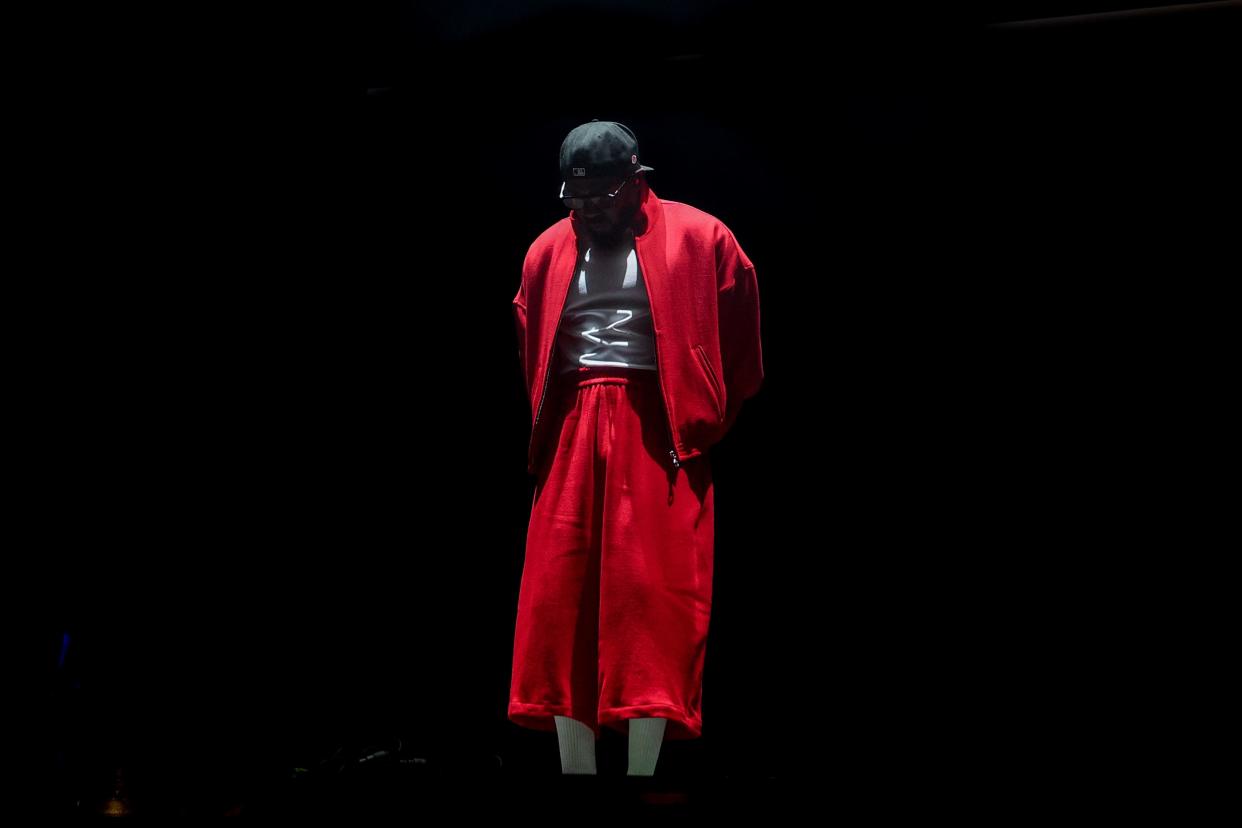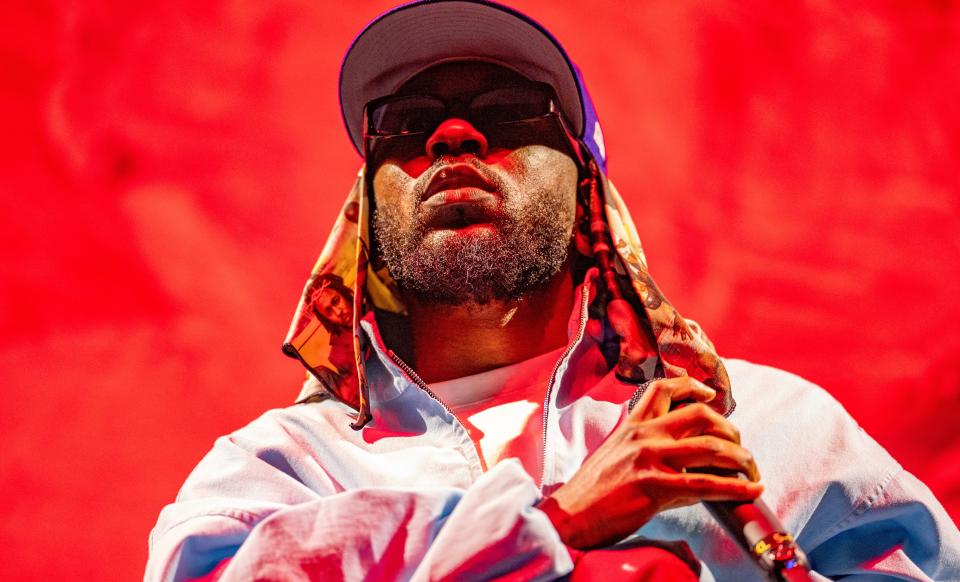The Drake/Kendrick Lamar Beef Has a Winner. Where Do We Go From Here?

- Oops!Something went wrong.Please try again later.
- Oops!Something went wrong.Please try again later.
Europa Press News/Getty Images
This past weekend, after a month of flirting with open warfare, the battle Drake and Kendrick Lamar finally tipped over into three days of exhilarating back-and-forth, and we’re still feeling the aftershocks. 2024’s biggest rap beef reached its presumed conclusion Sunday night with Drake’s despondent “The Heart Part 6,” but the online world hasn’t stopped reacting. The West Coast is treating “Not Like Us” like a triumphant battle cry. Educators are dissecting the lyrical complexities of the disses. Superfans of both artists appear to be spiraling.
Kendrick and Drake are the two most prominent rap superstars of the millennial generation, and over the years they’ve been framed as each other’s antithesis— Kendrick, the tastefully restrained storyteller who pops out every few years when he really has something on his heart to share, versus Drake, the decadent, ever-present workaholic who’s never let more than a few months of his 17-year career pass without releasing new material. Their struggle to upstage each other—culminating in the release of six tracks between them just in the last week alone— offered no shortage of spectacle. Drake used A.I. to troll Kendrick in the voices of his West Coast heroes to strike a nerve on “Taylor Made Freestyle”; Kendrick responded, on “Euphoria,” by paraphrasing the late DMX’s anti-Drake sentiments, drawing blood in a lower-tech way. “6:16” samples “What A Wonderful Thing Love Is,” a 1972 Al Green song that features Drake’s uncle Teenie Hodges on guitar; Drake promoted “Family Matters” on his Instagram by sharing “Buried Alive Interlude, Pt. 2,” named for a song from his 2011 Take Care album that featured Kendrick back when things were copacetic. Both rappers also swiped each other’s trademarks: Kendrick’s “6:16 in LA” played on Drake’s timestamp-in-a-specific-city song-titling convention, while Drake pulled a Young Thug Barter 6-esque move by naming his final entry “The Heart Part 6,” after Kendrick’s career-spanning series of the same name.
“Not Like Us,” meanwhile, has been read as a message to Drake fans who claim Kendrick isn’t capable of making club-ready anthems. But if you ask the right self-appointed internet rap analyst, every move that’s been made in this conflict has had a quadruple meaning. What we can say for sure: Regardless of their rivalry, these are men who’ve been acutely dialed into each other’s careers from the very beginning, which meant this standoff was always destined to be about more than deciding who was the best at rapping. It was destined to become what it became—a high-stakes battle to see who could obliterate whose integrity first.
Truth be told, the apparent end of the beef feels like the closing of a chapter in hip-hop’s story, where the teachings of the old guard met the interconnectedness of the new age. When’s the last time rappers born in the 80’s commanded this much of our attention? Save for Drake, none of the people who came in during the blog era’s latter years still mean something to any generation other than their own. Drake and Kendrick’s places within the genre’s pantheon of legends are pretty much established already. Anything that we get from them now is ornamental, which is why the sheer effort they both put in over the last few weeks has been something to marvel at. It also probably represents the end of an era: There’s so little material return for Gen Z’s biggest rappers to go toe-to-toe with one another outside of trading insults on livestreams and in interviews that this will likely not happen again. Not like this. This is for people who spent their childhoods watching rap superstars freestyle at radio stations and on BET’s after school television lineup in the early-to-mid 2000s. People who remember a time—even if it was their early childhood— when an MC was only as good as their staunchest competition, and calling yourself a rapper meant being ready to prove your superiority at any second.
In that respect, the feud has been a joy to witness. But it’s also been a reminder that, at its worst, hip-hop incentivizes the infantilization of grown men who need to be able to hold the attention of people in their teens and early 20s to remain powerful. In their late 30s, these brothers should be receptive and responsible enough to refrain from dangling abuse of women and children as a means to demonstrate dominance. That kind of decency is apparently too much to ask of men fighting desperately for a generational crown. And the consequences of those failures are already revealing themselves.
Before Drake’s “Family Matters,” he and Kendrick’s insults for one another drew on career and character deficiencies. In his “Like That” verse, K Dot shot down the notion of him being part of a three-man generational upper crust that also included J. Cole and Drake. In response, Drake came back with “Push Ups,” where he suggests Kendrick’s been getting screwed over by his former label boss Anthony “Top Dog” Tiffith and actually doesn’t even measure up to the likes of Travis Scott, SZA, or 21 Savage. On “Euphoria” Kendrick centers Drake’s obsession with fame and questions his commitment as a father— somewhat of a low blow, yet still within bounds of not mentioning anyone who wasn’t in the feud. “Family Matters” took a turn for the worst when Drake, in an attempt to quell attacks on his cultural and fatherly credibility, shifted the focus onto K Dot’s partner Whitney Alford, alleging that she’s suffered physical abuse at the Compton rapper’s hands and suggesting that one of her children with Kendrick is actually the child of his business partner Dave Free.
All hell broke loose from there. Each song that followed, from both parties, surfaced more rumors of domestic abuse, sexual assault, pedophilia, and hidden children, none of which has been substantiated. Now, as the dust is settling on the battlefield, Kendrick’s “Not Like Us,” which explicitly calls Drake and his camp “certified pedophiles,” is on track to debut at No.1 on the Billboard Hot 100, while “Family Matters” will likely not be far behind. What does it say about the state of hip-hop that an intoxicatingly catchy song that weaponizes child abuse is trending on TikTok where young people are targeted, being played at stadiums for pro sports teams, and shaping up to be one of the summer’s biggest hits?
For one, it says Kendrick and Drake are each, in their own way, determined if not desperate to fortify their respective legacies before it’s too late. In the next few years, they’ll both be 40, their tenure as pop-culture priorities behind them. You get the sense that their refusal to lose is tied to a midlife-crisis-informed, legacy-driven paranoia; Kendrick just seemed more willing to go the extra mile to secure a victory, regardless of how damaging it could be. Perhaps Drake didn’t anticipate him taking the feud so seriously. He couldn’t have, or he would have been prepared to throw more than I’m richer and more relevant than you bars K Dot’s way when the beef first started. On the other hand, Kendrick’s apparent IRL disdain for Drake seemed to drive him throughout the whole ordeal. He had a counter to everything the Toronto rapper threw at him, including what appeared to be ready-made disses with questionable assertions just in case things escalated to a personal level, as they eventually did. And unfortunately for both parties, even though “The Heart Part 6” feels like the waving of a white flag, the current social media landscape doesn’t allow for clear-cut winners in these kinds of ordeals.
Drake might lose some credibility in the eyes of hip-hop purists or people that were never comfortable with his dominance in the space, but even days after the showdown, there’s a sizable audience of folks defending him and trying to piece together evidence that will tip the scales back in his favor. In a worst case scenario, he’ll take his lumps, go away for a while to regroup, and return with low-stakes, danceable anthems. In the best case, he’ll come back angrier and with an even huger chip on his shoulder to guide him until his time runs out. But one thing he did succeed in was debunking Kendrick’s claim to the moral high ground as an artist. The heart of Drake’s argument in “Family Matters” is a valid one. He’s saying to Kendrick: You, too, have compromised your integrity to be as successful as you are because that’s what this type of relentless ubiquity — via corporate backing — requires, and your politics, when put under the magnifying glass, are shaky at best.
If anything, Kendrick’s willingness to engage in real mudslinging to come out as the victor confirms that accusation. Maybe that’s what Kenny has been trying to tell us this whole time, that he’ll blow all this shit up (the wholesome framing of his career included) before he’ll let a privileged Canadian ride off into the sunset unscathed. Every move Kendrick made was designed to strip Drake down to an insincere and insecure dweeb with no real foundation to stand on outside of an outsized ego. It’s why “Not Like Us” is so potent. Not only does it mock his opponent’s fans for only seeing the value in club-ready disses (the pacification he accused him of in the beginning of “Euphoria”), the signature West Coast production doubles down on Kendrick having a homegrown culture to lean on, something he says Drake doesn’t. He’s throwing a celebration for the Toronto native’s demise and everyone’s dancing along to it.
But where does this all leave us as fans? This is the first rounds-long heavyweight rap fight of the social media era and will likely be the last. The constant online chatter, desperate attempts from casuals to seem like insiders, and the tabloid-esque misinformation that made its way into the battle have made it into an intense stan-controlled disaster, draining so much of the fun out within a matter of days. As in all facets of our society, there’s no middle ground anymore. The post-truth algorithm craves conflict and extreme conviction by any means necessary. Just from this beef alone, fictional leaked screenshots of emails from UMG meetings have been circulating, a shooting outside Drake’s house in Toronto is being attributed to Kendrick by YouTube conspiracy theorists thirsty for engagement, and photos of Kendrick’s children are being unearthed and scrutinized to prove skin-tone-related points.
It’s all so very corny. What used to make rap feuds exciting was their insulation from the broader mainstream — hip-hop culture gradually constructed folklore around the content over time, amongst ourselves, while artists threw shots for months or years on end. The rumors that came out of those battles weren’t any less harmful, but at least they could eventually fizzle out. Hip-hop is so commodified now that even diss tracks are eligible for chart placement and fair game for television syncs and brand deals. (Joe Biden's campaign has already appropriated “Euphoria” for a video throwing shots at Donald Trump.) And the victims of alleged abuse who were used as pawns in the feud will now be bombarded with heightened visibility as soon as they open their phones, including children whose brains aren’t capable of processing what they see. History will remember this as one of the most significant battles hip-hop has ever seen, if not the most— but we might regret the precedent it sets sooner than we expect.
Someone go hand him a Grammy right now\!
Kendrick and Drake diss each other multiple times in one weekend, A.I. shenanigans, shots fired at and from Future, Metro Boomin, Rick Ross, Weeknd, and more in a new chapter in rap geopolitics.
Originally Appeared on GQ



